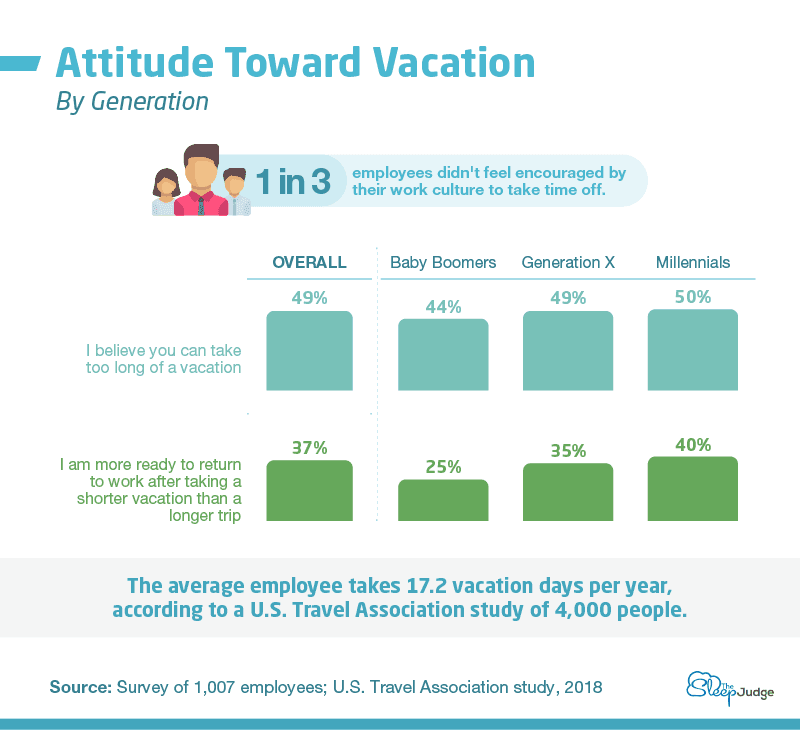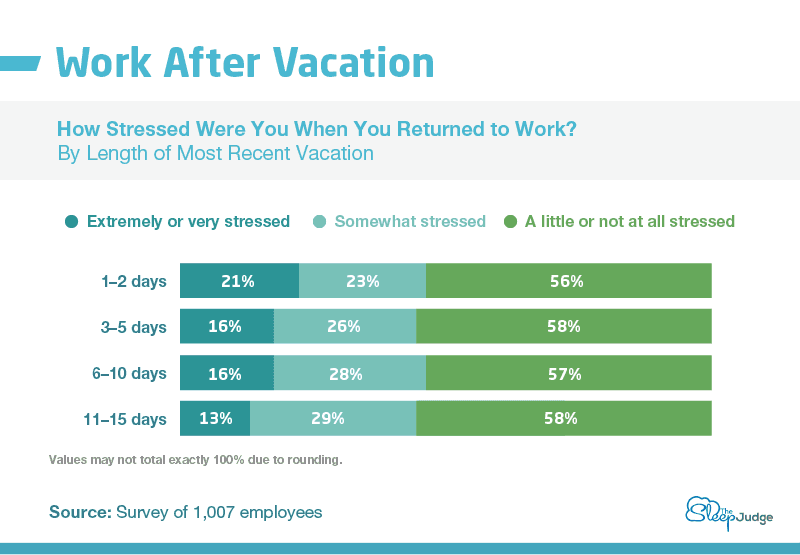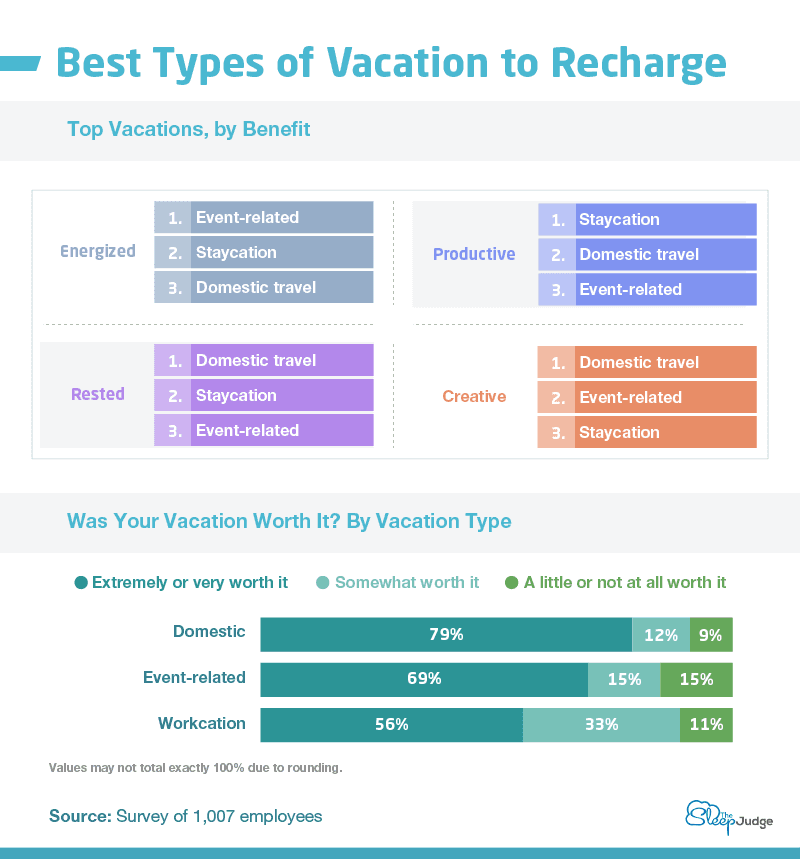The U.S. is one of just six countries that don’t federally mandate a set number of days off from work. Compared to Kuwait (30 days), the United Kingdom (28 days), and Austria (25 days), to name a few, there’s no guarantee that Americans will get any paid time away from the office.
Yet, instead of cherishing the vacation time they’re afforded, a majority of American employees with paid time off will leave hours unused at the end of the year, including those who let 50% or more of their holiday time expire. However, research on the matter is abundantly clear: Going on vacation is good for your health and may improve success and productivity at work.
But are all vacations created equal, and if you only use a fraction of your paid leave, will some travel leave you more relaxed and recuperated than others? To find out, we surveyed over 1,000 employees about their vacation habits and the connection to their overall health. Read on as we explore why so much paid time off goes unused, the ideal number of days off, and whether a “workcation” can be just as beneficial as international travel or a domestic destination.
Quality Over Quantity?
According to some, the U.S. is the leading “no-vacation nation” in the world. Among other reasons, Americans may feel dread at the idea of getting away from the office because they’re likely to fall behind at work or because their boss might judge them for leaving at all. As we found, 1 in 3 employees said their workplace culture didn’t encourage vacation use.
If you’re going to take the plunge and request time off, though, how long should you go for? When planning time off, you might consider how long certain projects can go unattended, or how long your email can reasonably sit unread. More common among younger generations of employees (who are often thought to overvalue travel), nearly half of those polled overall believed there was such a thing as taking too long of a vacation. Fifty percent of millennials agreed there was a limit to how much time they should take off, and another 40% suggested they were more ready to return to work after a short time away than a longer vacation.
According to a U.S. Travel Association study of 4,000 people, the average American employee takes 17.2 vacation days every year, so according to generational sentiments on proper vacation length, some may be taking more days off consecutively than others!
You may be interested in: How to Find the Best Travel Bags for Your Travel Needs
Ideal Vacation Length
It’s easy to suggest that taking time off is good for your health, but we asked employees to rate how they felt after a vacation in four categories: rest, productivity, creativity, and energy. We asked specifically if employees felt they had more of these benefits after their vacation, based on how much time they took off. Here’s what we found:
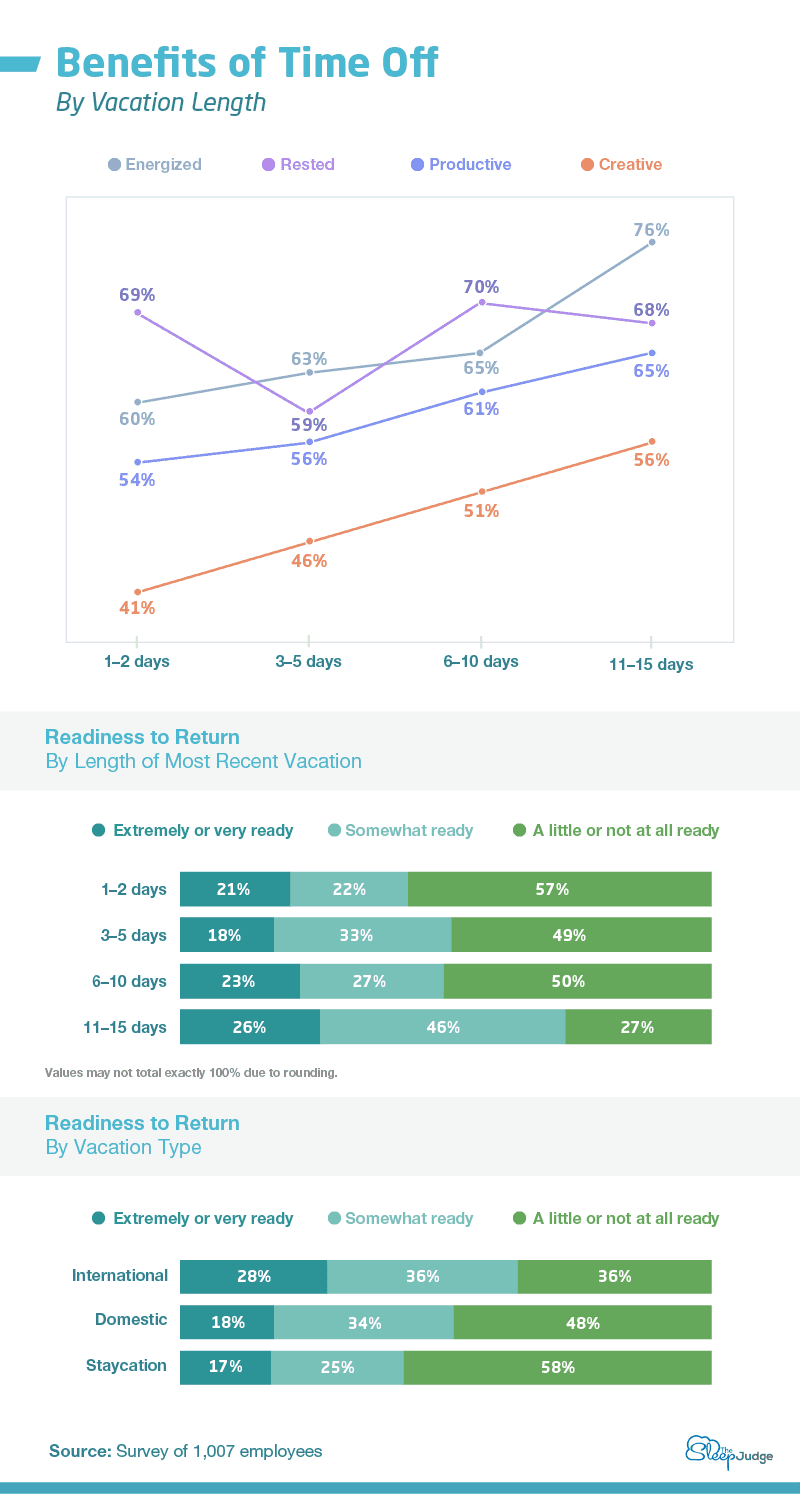
Taking a break from your standard workload (or even a microbreak during the day) can prevent burnout and, thus, boost productivity. Because you’re less likely to feel stressed after being away from the office for a longer period (or even tired or less engaged), you may find your work benefits from routine time off. Longer vacations also left employees more ready to go back to work compared to taking just one or two days off, where more than half of people were only a little or not at all ready to return to the grind.
Still, not all extended travel is without pressure. Depending on the trip you’re taking, you might walk away feeling like you need a vacation from your vacation. Employees were the most rested (70%) after taking a six- to 10-day vacation or even just one or two days (69%), compared to three to five days (59%) and 11 to 15 days (68%). International travel typically left employees the most prepared to face work again, followed by domestic vacations and staycations. A staycation might sound like the perfect way to unwind without having to plan a major trip, but they caused employees to feel the least prepared to return to their jobs.
Struggling to Unplug
For some employees, a “workcation” (working vacation) may offer the best of both worlds. Providing an opportunity to take your work to a more exotic or remote destination (like the beach or a new city), some companies offer their teams the flexibility to work remotely so that they can receive the benefits of a vacation without fully unplugging from the office.
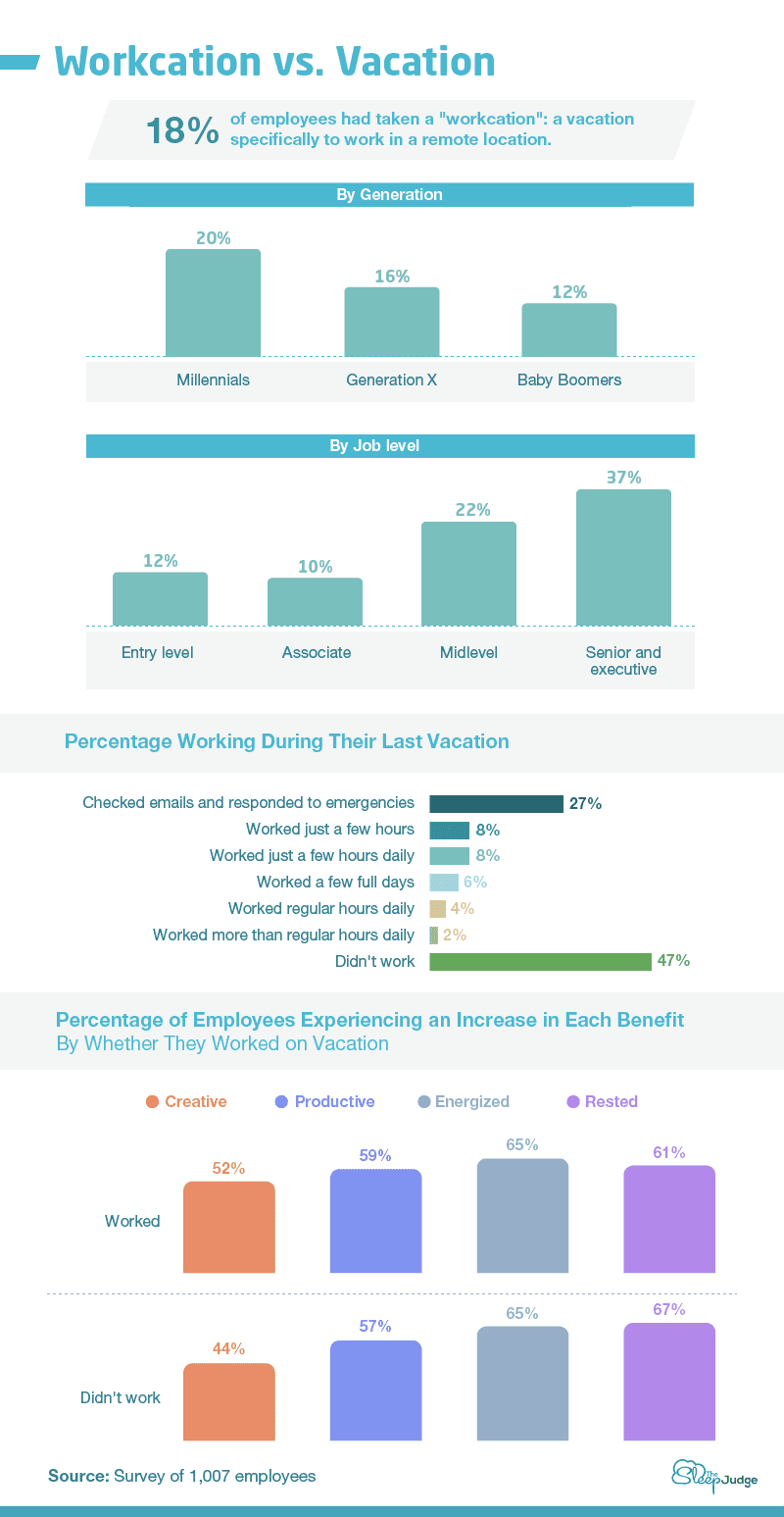
Those surveyed typically felt more rested when they avoided work on vacation but reported feeling equally energized either way. However, respondents felt more creative and productive when they did some work while away.
Back to the Grind
If you’re feeling anxious about taking time off work, there are plenty of buffers to help reduce stress. From extending your “out of office” email to coming back in the middle of the week rather than the start (or coming back for a half day rather than a full shift), you can ease or eliminate stress after coming back from a vacation.
There was almost no difference in the likelihood of feeling a little or not at all stressed from vacation regardless of the number of days taken. While shorter trips were more linked to extreme stress, there was just a 2 percentage point difference in the number of people who felt only a little or not at all stressed after one or two days on vacation compared to 11 to 15 days. Generally speaking, taking any amount of time off from work meant over half of employees, by any length of vacation time, felt less stressed about work!
Trips With Benefits
Before deciding which destination you’d like to travel to next, you might want to think about what you can accomplish with your time off from work. You might also want to think about what benefits you need most from your time off and whether or not that trip will help you get there, be it more energy, more productivity, more creativity or just more restfulness.
Want to feel more creative and rested when you get home? You should consider a domestic trip, which can help make you feel happier and more creative if planned appropriately. Want to feel more energized instead? Employees suggested an event-related vacation was the best bet.
Ultimately, domestic trips (79%) were the most likely to be “extremely or very worth it,” followed by event-related vacations (69%) and workcations (56%).
Finding the Perfect Balance
Whether you’re planning to go away for a few days or a few weeks, there’s more to a vacation than making sure you have enough time off or deciding where to go.
Traveling can be expensive, and getting the most value out of it means knowing what you want to accomplish. Employees were more likely to feel the benefits of traveling when they took longer trips, either domestic or abroad. And while spending too much time working on vacation can hinder the perks of getting away, checking your email from time to time might help you feel more productive or energized when you get back to work.
If you want to keep feeling energized and well-rested long after your vacation has ended, The Sleep Judge is your resource for finding the best sleep possible. From top-rated mattresses to mattress toppers and sofa beds, The Sleep Judge combines mattress reviews from the most popular brands in one place so that you can find the perfect sleeping solutions for your home and travels. Visit us at TheSleepJudge.com to learn more.
Methodology
We surveyed 1,007 employed people who had taken a vacation in the last year to understand the impact of vacation on employee health. The generation breakdown was as follows: 605 respondents were millennials (born 1981 to 1997); 273 respondents were from Generation X (born 1965 to 1980); and 91 respondents were baby boomers (born 1946 to 1964). 145 respondents were entry-level workers, 313 were associates, 413 were midlevel, and 130 were senior or executive employees.
Limitations
Limitations apply for survey-based data and include selective memory, telescoping, and exaggeration. We did not statistically test our data, and our campaign is purely exploratory.
Fair Use Statement
Want to help your readers plan their next great getaway? We’d love to see the results of our study shared on your site for any noncommercial use with the inclusion of a link back to this page as credit to our contributors.

